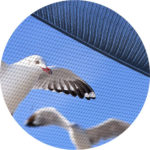Holiday Food Safety

Feasting with family is part of many holiday celebrations. Follow these simple tips to help prevent food poisoning, or foodborne illness, during the holidays. While COVID is restricting most big gatherings, the holiday feasts will still occur and aside form social distancing and wearing of masks, food safety practices need to be at the forefront. Follow these simple tips from the CDC for ensuring food safety:
1. Cook food thoroughly. Meat, chicken, turkey, seafood, and eggs can carry germs that cause food poisoning. Use a food thermometer to ensure these foods have been cooked to a safe internal temperature.
2. Keep food out of the “danger zone.” Bacteria can grow rapidly in the danger zone between 40°F and 140°F. After food is cooked, keep hot food hot and cold food cold. Refrigerate or freeze any perishable food within 2 hours.
3. Do not eat raw dough or batter. Dough and batter made with flour or eggs can contain harmful germs, such as E. coli and Salmonella. Do not taste or eat raw dough or batter that is meant to be baked or cooked. This includes dough or batter for cookies, cakes, pies, biscuits, pancakes, tortillas, pizza, or crafts.
4. Keep foods separated. Keep meat, chicken, turkey, seafood, and eggs separate from all other foods at the grocery store and in the refrigerator. Prevent juices from meat, chicken, turkey, and seafood from dripping or leaking onto other foods by keeping them in containers or sealed plastic bags.
Some information sourced from CDC.gov
Submitted by: Rich Gibson, ACE, CFSQA
The Cowpea Weevil

Order: Coleoptera Family: Chrysomelidae Genus: Callosobruchus Species: C. Maculatus
The Cowpea Weevil is a member of the leaf beetle family, Chrysomelidae, and not a true weevil. This common pest of stored legumes has a cosmopolitan distribution, occurring on every continent except Antarctica. The cowpea weevil lacks the “snout” of a true weevil.
Adult weevils are 1/8-inch long, reddish-brown slightly elongate beetles compared to the typical rounded appearance of other members of the same family. Wing covers are marked with black and gray and there are two black spots near the middle. The wing covers (elytra) are short, leaving the last segment of the abdomen exposed. Adults may be found outdoors in flowers in early spring. Eggs laid by females hatch in 5 to 20 days. Larvae typically feed inside the cowpea, taking from 2 weeks to 6 months to develop before pupating there. Six or seven generations may occur per year. Mouthparts are for chewing. They prefer dried cowpeas but will attack other beans and peas in storage.
As with other stored product pests, the IPM approach should be used in control. Inspect incoming legumes for beetles
and monitor indoor legume storage regularly, locate and dispose of infested legumes and store all susceptible food
items in pest-proof containers.
Submitted by: Rich Gibson, ACE, CFSQA
Bird Pressure

A client in the Southeast region has had ongoing exterior pressure from Starlings and Sparrows. These birds were clearly generational as they displaced immense comfortability in high traffic areas. Their numbers have exceeded all threshold levels.
Starlings/Sparrows can cause an infestation of bird mites, continuous unpleasant odors resulting from their feces/droppings and disease. The roosting and some nesting areas were right above an area where raw ingredients get unloaded from trains and transported into the facility.
Sparrows are noisy and flutter down from eaves and fencerows to hop and peck at crumbs or birdseed. Look for them flying in and out of nest holes hidden behind shop signs or in traffic lights or hanging around parking lots waiting for crumbs and picking insects off car grills. They have lived around humans for centuries. They can be seen on city streets, taking handouts in parks and zoos, or cheeping from a perch on your roof or trees in your yard. Sparrows are absent from undisturbed forests and grasslands, but they are common in the countryside around farmsteads.

Starlings are boisterous, loud, and they travel in large groups (often with blackbirds and grackles). They race across fields, beak down and probing the grass for food; or they sit high on wires or trees making a constant stream of rattles, whirrs, and whistles. Starlings are common in towns, suburbs, and countryside near human settlements. They feed on the ground on lawns, fields, sidewalks, and parking lots. They perch and roost high on wires, trees, and buildings.
RK Environmental Services (RKE) arranged an onsite assessment of the bird activity at this food manufacturer. RKE outlined the work necessary to solve the ongoing bird problem.
The Onsite Concern- Starlings and Sparrows are roosting and nesting along the pipe runs and the beam structures that hold them in place. This is above the incoming train unloading area for raw ingredients. Facility staff was complaining about the droppings all over the place at the ground level.
The Onsite Solution- RKE sent in a team of 4 for two weeks to net in the pipe runs and upper beam structures.
This will prevent the roosting and nesting of the birds. The team used simple tools and methods to accomplish
this. We ran steel cables along the runs, anchoring them to turnbuckles. This built the framework we needed
around the structure to secure the netting to. We then draped the knotted stealth net (3 large sections)
around the framework and fastened it to the steal cable with hog rings. The hog rings lock on the both the
net and the steal cable, holding it together permanently. Throughout the project, RKE ran into some
challenges where the lifts could not gain full entry and ladders had to be used. The team used a combination
of manual hog ringers and a pneumatic hog ringer to lock in the hog rings.
Current Concern– The client is satisfied with the results. Bird pressure has been deterred to other areas, which is
now leading to more project work soon.














